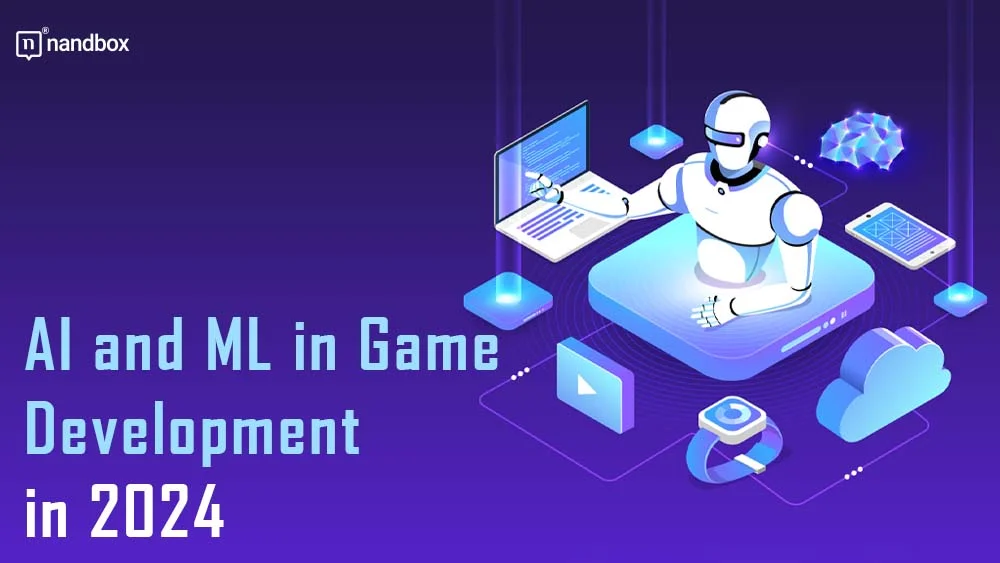Machine Learning and AI in Game Development in 2024
Artificial Intelligence has become a huge trend in the last few years. This advancement revolutionized so many industries. The game development niche benefited a lot from this innovation. It opened up so many possibilities for designing high-quality and immersive virtual worlds. We believe that of AI in game development will only continue to thrive. So, you definitely need to keep up with this trend. Keep reading and learn about its impact in 2024.
The Impact of AI on Game Development
We can all agree that AI is one of the biggest breakthroughs of the last few years. Now, its influence extends way beyond science. This technology has the potential to change many industries. Game development is no exception. It benefited a lot from this advancement. We think it will be even more influential in 2024. Let’s take a look at the opportunities AI in game development can bring.
Better Player Experience
One of the biggest benefits of this innovation is the possibility to improve player’s experience. You can use this development to create more sophisticated NPCs. They will adapt to player actions and decisions. Also, you can make the entire game environment more dynamic with its help. For instance, you may include
- Procedurally generated landscapes;
- Weather patterns;
- Day-night cycles, etc.
The virtual world will become more realistic and responsive. It can help you keep your players engaged.
Plus, AI algorithms can analyze gamer performance and behavior. It allows them to adjust the difficulty level. For example, it can fine-tune the enemy aggression or puzzle complexity.
You can include virtual assistance systems in your games as well. They will provide contextual guidance when needed. They can offer
- Hints or tutorials during challenging sections;
- Quest objectives;
- Personalized advice, etc.
Procedural Content Generation
Procedural generation techniques allow you to design the games much faster. They automate many time-consuming manual processes. How can you use them in 2024?
Terrain Generation
You can create realistic terrain for open-world games or RPGs with these algorithms. They evaluate parameters, like
- Elevation;
- Biome distribution;
- Geological features, etc.
Additionally, AI can adapt terrain generation based on player preferences.
Level Design
This advancement can help you design levels and mazes. You can use ML techniques to make the level layouts adaptable. They will balance the difficulty and pace based on the gamer’s feedback.
Asset Creation
Also, you can employ procedural synthesis and generative adversarial networks to generate
- Textures;
- Models;
- Animations.
Dialogue Generation
AI analyzes narrative structures and character relationships. Then it generates storylines and dialogue options that adapt to player choices. They can change their decisions and explore different paths.
Realistic Simulation
As we’ve noted above, this advancement can help you make your virtual world more immersive. You can use it to simulate realistic physics. AI-driven engines calculate the motion and interactions of game objects. It results in lifelike simulations of
- Gravity;
- Momentum;
- Friction, and other physical forces.
Also, these algorithms mimic the behaviors of characters and creatures. You can use them to model decisions and social interactions.
Plus, you can make your animations more realistic with the help of AI. These systems can produce fluid and natural movements. So, your players will be more emotionally engaged with the game.
Adaptive Game Design
AI algorithms continuously learn and evolve based on player interactions. They can
- Anticipate player behavior;
- Predict preferences;
- Adjust game mechanics, etc.
It allows you to refine the game design accordingly. Also, it gives you the possibility for customer retention. You can include challenges and rewards in your game. It will keep people motivated and invested in the game for longer periods.
In addition to better game design, AI development services have also democratized the development process itself. These tools give more opportunities for aspiring developers with limited programming experience. They can now create complex games relatively easily.
Use Cases of ML Algorithms
Machine learning algorithms have multiple applications in game development. They can influence the design aspects and gamer experience. Below, we gathered some of their use cases.
Player Profiling
As we’ve mentioned above, ML algorithms can analyze player data, including
- Gameplay behavior;
- Preferences;
- Skill levels and more.
So, you can understand the tendencies and patterns better. It gives you the possibility to create a complete player profile. That way you can make the game more individualized and target the content.
Fraud Detection and Cheat Prevention
Also, you can use these algorithms to detect fraudulent behavior. They evaluate interactions and gameplay patterns. It allows them to identify suspicious activities such as cheating or hacking. So, you can create a fair and balanced playing field with their help.
NLP for Conversational NPCs
Algorithms related to NLP are becoming more common as well. They give you the possibility to create conversational NPCs with advanced dialogue systems. They can help you boost the immersion level. For example, these systems
- Respond to player queries;
- Engage in meaningful conversations;
- Provide contextually relevant information;
- Give quest guidance, etc.
Content Recommendation
Also, they constantly assess players’ reactions. It allows them to suggest content and facilitate game discovery. You can combine filtering and recommendation systems to
- Personalize game recommendations;
- Suggest in-game purchases;
- Promote community-generated content, etc.
Testing and Quality Assurance
ML algorithms automate the process of quality assurance and bug testing as well. They examine codebases and game assets to identify possible issues. This can really help you accelerate the debugging process.
It gives you the possibility for a stable game launch. Another thing you can do to make it even more smoother is a systematic plan. You can cooperate with an event app development company. It will be much easier to execute the launch occasion with their application.
AI and Mobile Gaming
AI has not only changed the video gaming niche. It also influenced how mobile game development services operate. This advancement makes all the processes way more effective. Here are some of the benefits it can give you in 2024.
Higher Security
AI solutions can improve the protection of your mobile apps. These algorithms analyze user behavior patterns and detect anomalies. It allows you to mitigate potential risks before they escalate.
They use data from global threat intelligence sources. So, they can alert you about
- Emerging threats;
- Malware signatures;
- Attack patterns, etc.
Also, they can automatically adjust access controls and permissions. So, all the sensitive data and functionalities will be safe.
Streamlined Development
AI automates repetitive tasks and accelerates development cycles. It can save you a lot of time and money. You can focus more on the creative part. Here are some functionalities it offers:
- Code generation;
- Intelligent code review;
- Predictive modeling;
- Automated testing and deployment;
- Smart debugging;
- NLP for documentation.
Voice Integration
Another advancement is AI-powered voice technology. More and more people today prefer hands-free interaction. So, it makes apps more convenient and accessible for users.
Also, voice commands allow them to accomplish tasks quickly. It is particularly valuable in situations where people are occupied. Moreover, voice integration facilitates communication in multiple languages. It gives you the possibility to reach a wider audience.
Challenges
AI offers tons of opportunities for game development. However, it has its own drawbacks. So, you might have some difficulties on your way. Below we gathered the most common challenges.
Complexity of Implementation
AI integration requires specialized expertise and resources. You need to be familiar with its complex algorithms, and data structures. So, you might need to spend more time and money on education.
Scalability and Performance
You need significant computational resources to work with this innovation. This can pose some challenges for scalability and performance optimization. It can be especially difficult if you operate in large-scale gaming environments. You’ll have to balance this complexity with efficient resource utilization.
Realism
It can be hard to achieve believable behaviors in game development as well. It’s pretty complicated to design AI that convincingly simulates human-like emotions and interactions. You may need some extensive training and testing.
Integration with Existing Systems
Also, it might be difficult to integrate this advancement into your current development pipelines and legacy systems. You may have some problems with compatibility. We recommend collaborating with legacy modernization services to handle these issues. They can help you with data migration and interoperability.
Conclusion
We can all agree that AI is our future. It already has a big influence on various niches. We believe that its impact will only continue to grow, especially in game development.
This advancement gives you the possibility to simplify the development process and improve player experience. You can make your games more realistic and engaging with its help. The possibilities are endless!
Hope that you found our guide helpful. We strongly recommend getting familiar with this innovative technology by taking online ML and AI courses. It will definitely open up so many new opportunities for you in 2024!







